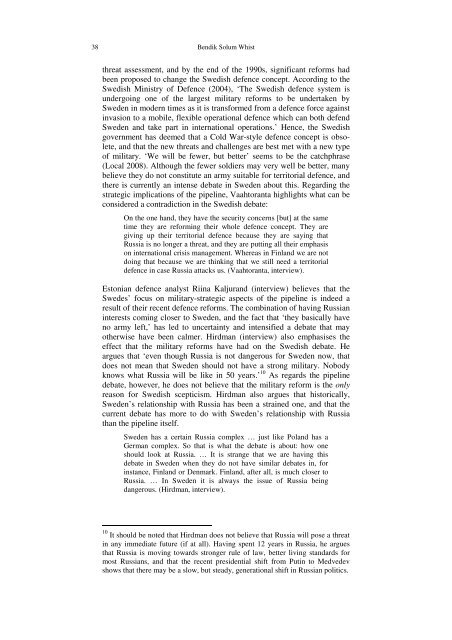Nord Stream: Not Just a Pipeline
Nord Stream: Not Just a Pipeline
Nord Stream: Not Just a Pipeline
Create successful ePaper yourself
Turn your PDF publications into a flip-book with our unique Google optimized e-Paper software.
38 Bendik Solum Whist<br />
threat assessment, and by the end of the 1990s, significant reforms had<br />
been proposed to change the Swedish defence concept. According to the<br />
Swedish Ministry of Defence (2004), ‘The Swedish defence system is<br />
undergoing one of the largest military reforms to be undertaken by<br />
Sweden in modern times as it is transformed from a defence force against<br />
invasion to a mobile, flexible operational defence which can both defend<br />
Sweden and take part in international operations.’ Hence, the Swedish<br />
government has deemed that a Cold War-style defence concept is obsolete,<br />
and that the new threats and challenges are best met with a new type<br />
of military. ‘We will be fewer, but better’ seems to be the catchphrase<br />
(Local 2008). Although the fewer soldiers may very well be better, many<br />
believe they do not constitute an army suitable for territorial defence, and<br />
there is currently an intense debate in Sweden about this. Regarding the<br />
strategic implications of the pipeline, Vaahtoranta highlights what can be<br />
considered a contradiction in the Swedish debate:<br />
On the one hand, they have the security concerns [but] at the same<br />
time they are reforming their whole defence concept. They are<br />
giving up their territorial defence because they are saying that<br />
Russia is no longer a threat, and they are putting all their emphasis<br />
on international crisis management. Whereas in Finland we are not<br />
doing that because we are thinking that we still need a territorial<br />
defence in case Russia attacks us. (Vaahtoranta, interview).<br />
Estonian defence analyst Riina Kaljurand (interview) believes that the<br />
Swedes’ focus on military-strategic aspects of the pipeline is indeed a<br />
result of their recent defence reforms. The combination of having Russian<br />
interests coming closer to Sweden, and the fact that ‘they basically have<br />
no army left,’ has led to uncertainty and intensified a debate that may<br />
otherwise have been calmer. Hirdman (interview) also emphasises the<br />
effect that the military reforms have had on the Swedish debate. He<br />
argues that ‘even though Russia is not dangerous for Sweden now, that<br />
does not mean that Sweden should not have a strong military. Nobody<br />
knows what Russia will be like in 50 years.’ 10 As regards the pipeline<br />
debate, however, he does not believe that the military reform is the only<br />
reason for Swedish scepticism. Hirdman also argues that historically,<br />
Sweden’s relationship with Russia has been a strained one, and that the<br />
current debate has more to do with Sweden’s relationship with Russia<br />
than the pipeline itself.<br />
Sweden has a certain Russia complex … just like Poland has a<br />
German complex. So that is what the debate is about: how one<br />
should look at Russia. … It is strange that we are having this<br />
debate in Sweden when they do not have similar debates in, for<br />
instance, Finland or Denmark. Finland, after all, is much closer to<br />
Russia. … In Sweden it is always the issue of Russia being<br />
dangerous. (Hirdman, interview).<br />
10 It should be noted that Hirdman does not believe that Russia will pose a threat<br />
in any immediate future (if at all). Having spent 12 years in Russia, he argues<br />
that Russia is moving towards stronger rule of law, better living standards for<br />
most Russians, and that the recent presidential shift from Putin to Medvedev<br />
shows that there may be a slow, but steady, generational shift in Russian politics.













